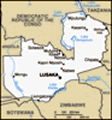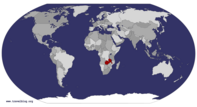Advertisement
Published: April 29th 2008
There are two Catholic Sisters' houses in Chipata, mine and another, bigger one, where 12 live. However, I understand that what with all the other Christian denominations there may be as many as 5 or 6 convents, so Chipata is alive with prayers and good thoughts. As Chipata is a bit of a hub, there are frequently Sisters crashing over en route from somewhere to somewhere else, and it is not uncommon for me to come home and greet two or three people, feeling very guilty that I can't remember their names (especially in the dark), only to find that I've never met them before. I've had to pinch myself several times when coming to breakfast in the morning and finding myself faced with 8 or 9 habits! Not sure Father Ted could have coped...
There are 5 Sisters; Sisters Marisalla (the head, not 'Mother', the Mother is boss of both houses, and lives at the larger), Hortensia, Astrida, Patricia and Cecilia- they all work in the community, many at the Craft Centre (see below)
I've also met some very interesting women passing through (though can't remember all their names). Surprisingly (initially to me at least), many are quite
well- travelled, and a number have spent some time in the West, and often in the British Isles. One Sister has spent time teaching Irish History in a Protestant school in Dublin, which sounded incredibly challenging, especially as was back in '97, I think before the Good Friday agreement. Also met a Mother Superior who spent a year in Cliftonville and thought the North Kent coast (especially Margate) very beautiful, though has a warped view of English weather as she was there in October 87... And there's also Sister Manuela, a very lively spark from South Korea who visited for a few days and I really appreciated; as she's from the Copperbelt region and speaks Bemba not Nyaanja, it made my sisters speak more in English, from which I benefited as well. She had to spend some time in England to get her language skills up before getting posted to Zambia; apparently Koreans have the verb at the end of the sentence, which was very difficult for her to change.
I live in the Sisters' House in the middle of a big complex next to a big Catholic Diocese complex called the St Anne's Craft Centre. This is an

 Garden
Garden
Chicken house in middle, on the left you can see the edge of the burning pitinstitution set up by the church to provide suitable training in things like carpentry, printing, tailoring, baking and ceramics to local youths. Have spoken to a few as I wait outside the house for my lift in the morning and have been giving two likely lads a few lessons on my laptop when I get back from work, but will tell you more about that another time.
They wear standard royal blue-ish nuns' habits, except on Sunday when they have a white one, but wear a Zambian chitenga, brightly coloured printed skirt, on top. At first I tried to use this to differentiate between them (since they all dress identically and cover their head and most of the time I see them it's dark), but they own too many to keep track!
They all speak pretty excellent English, as do all the Zambians I've met, who have some education. They generally speak in Nyaanja between themselves and in my company unless there is a conversation they explicitly wish me to join in, so for much of the time am sat observing. However, they are a lively bunch and when they're sat around they chatter and giggle (often quite
hysterically, especially if Sisters are visiting from another house) like I expect any group of women would who know each other very well.
The house has quite a big garden by Zambian standards wrapped around the house. In it they grow avocados, which are lovely for breakfast, pawpaws, which haven't had yet, and other vegetables. They also have chicken houses, though no chickens at the moment. There is a poultry shed next to the house with several hundred birds, but am told that these are for the local school (though this doesn't compute with what someone else has told me about school meals, but will unravel that one in time). There are no rubbish collections. Waste is divided into 2 parts; leftovers for the dog and 'other'. Other is burnt in a big pit at the bottom of the garden. It surprises me a bit that there is no composting.
Here, then, is a typical work day living at the Craft Centre, with some additional notes:
5am (though less so as have acclimatised) woken by tomtoms and singing from the chapel as the Sisters do their first prayers of the day. Roll over and go back to
sleep.
(6-6.30am Sisters tootle off to Mass at the nearby church)
6.30am I get up, have cold shower and get dressed. There is only cold water from the taps in the house. For bathing, the Sisters boil pans of water, but given the limited number of rings for the large numbers of people and the fact that I have to boil all my drinking water anyway and there is no suitable bath-shaped receptacle, I really can't be bothered.
7am breakfast grace and my favourite meal of the day- cup of tea, some bread and if lucky a slice of beautiful ripe avocado from the garden. Tea's odd; they (and other Zambians) boil a kettle and then pour into a large thermos flask to store, and this is used to make the tea as and when. Tea is made with a strainer of (pretty good quality) tea leaves over a cup which is passed between people. The bread is slightly sweeter than we would have. Sometimes the Sisters make their own.
Between breakfast and pickup for work in the minibus or truck I sometimes do a few jobs like start some washing going.
7.45-7.55ish pickup
8am official work starts. Every Monday morning the whole staff has mass in the meeting room first thing.
Will tell you about work content another time.
12.30 taken home for lunch
12.45 lunch. grace and then the pattern for the two main meals. I think I prefer lunch to evening meal; there is usually something hot besides nshima (eg potatoes) and you can see what you're about to eat, which is helpful if it's something new and not leftovers. Basically, several pots are laid out and I take a plate and fork and take a bit from each.
1-1.30 I usually have a little kip
1.45-1.50 pickup
2pm work starts for afternoon
5pm pickup
5.20-dark/powercut, usually at 6 something. Once or twice a week I show 2 lads things like Word and Excel on my laptop. If not that, then may sort some ironing (to ensure no bugs more than getting flat!) or read a bit. Sometimes I watch a bit of telly; there are often documentaries about the weird and wonderful tribal ceremonies of the Copperbelt region.
6pm Sisters have evening prayers in chapel. Am normally sat in my room with a candle waiting for them during this. Until last week would lie on my bed and if there's power in my laptop put on some music- couldn't really do much else. However I now have a collapsible deckchair (called the Admiral's chair which has arms with a drink holder space which gives me something a little more relaxed to sit in
6.45-7 Sisters surface and time for dinner. Same format as before really; the contents will have changed slightly as some food will have been cooked in the afternoon. The 'girl', Stella (I think this is her name) cooks and leaves food on the side when she leaves for home at 5pm. We eat dinner on our laps in the lounge, all sat round one candle in the middle.
Until power comes we, or rather they as it's mainly in Nyaanja, chat and fiddle with our mobile phones. If power doesn't come on till late (i.e. after 8.30pm) I am sometimes brought to the present by a sudden silence and everyone's looking expectantly at me as they want to do goodnight prayers. This isn't every night though. If the power does come on while everyone is still awake we invariably watch a bit of telly. This may often be European football competitions- Man U and Chelsea are widely supported, though my employer Father Richard likes Arsenal. It is funny when the Scottish team managers comment at half time as it's patently clear noone understands a word they say (As a by the way, my VSO colleague Julie is having great fun up in Lundazi trying to explain the difference between England and Wales). Other favourite evening shows include a parade of highly dramatic soaps; there is one from Ghana and one from South Africa and one very badly dubbed one from South America. They have names like 'I stand accused' and 'Babylon'. The Sisters know all the ins and outs, and I got caught out one day by walking in on the description of a particularly exciting storyline (someone extracting revenge on someone else for having left them to rot in a prison, and I think there was a baby in there somewhere), and it was a good 5 mins before I clicked they were talking about the telly and not the local congregation!
The Sisters' favourite program, though, is on Sunday afternoons at 5pm. It's called 'Touching Lives' and is heavily advertised. Have seen it once- it involves Celtel (the mobile phone network) receiving applications from the families and friends of the deserving poor, people with very little but who are selfless and well-loved by their communities (eg schoolgirl caring for sick father, elderly grandmother taking goods long distances to market each day) and then sorting their lives out. Typically this entails a promise to knock down and replace their house, and then the beneficiary sits in the studio while domestic goods are wheeled in eg a bed, a 3 piece suite. Part of this is often some means to earn a living, so the Grandmother was given a phone so she could operate a Community pay phone, and neighbours would then pay her to use the phone, and this income would mean she would no longer have to travel to market. The thing that struck me was that, despite the enormous families here (7 not untypical, have met several 'one of thirteen'), and which are often mentioned in passing, the burden of caring is never distributed, and it always seems to be one poor sod who takes on the full responsibility, which means double poverty as they have no time to earn a living to support them and the cared-for.
At some point will go to bed, having sprayed myself with Deet perfume and tucked in the mozzie net. If the Sisters go before I'm ready may read a bit or, more likely, do some typing (like this). Am not sure whether it's because the weather is changing a bit, but I think the rats in the ceiling are fighting more- can be quite disturbing if I get to sleep and then they start screaming at each other.
Advertisement
Tot: 0.038s; Tpl: 0.012s; cc: 8; qc: 23; dbt: 0.0185s; 1; m:domysql w:travelblog (10.17.0.13); sld: 1;
; mem: 1.1mb










Bill
non-member comment
Tea...
What? No decent tea? How are you coping!!? And I noticed you harking back to your doctorate in your penultimate paragraph :)